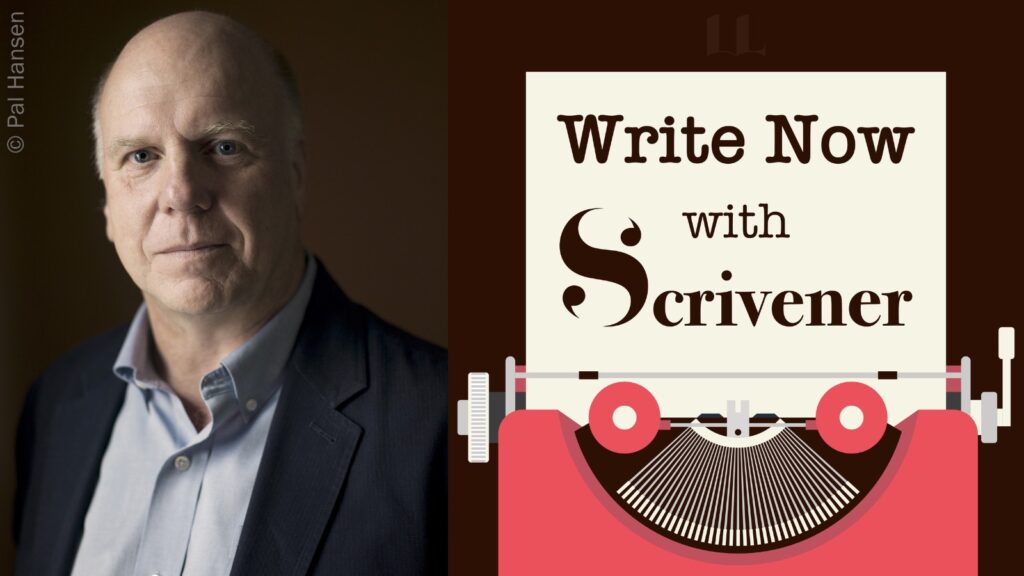Introducing our new podcast, Write Now with Scrivener, with our first guest, Peter Robinson.

Today we’re excited to announce the launch of our new monthly podcast, Write Now with Scrivener. Join journalist Kirk McElhearn as he interviews writers of all kinds about their processes, routines, and how they use Scrivener.
In the first half of the show, writers share their experiences and their different approaches to getting words down on the page; in the second half, they get into the specifics of how they use Scrivener to help them.
In the first show, Kirk talks to best-selling author Peter Robinson. So without further fanfare, over to Kirk…
We welcome Peter Robinson, best-selling author of the Alan Banks crime series. Peter has written more than two dozen novels, and discusses his character, how he uses music in his novels, and how Scrivener helps him manage his manuscripts.
Show notes:
- Peter Robinson
- Latest novel: Not Dark Yet
- Bob Dylan: Not Dark Yet
Learn more about Scrivener, and check out the ebook Take Control of Scrivener.
If you like the podcast, please follow it in Apple Podcasts or your favorite podcast app. Leave a rating or review, and tell your friends. And check out past episodes of Write Now with Scrivener.
Peter Robinson has written more than 30 books of crime fiction, including 27 in his Alan Banks series. A Yorkshire native, Peter lives most of the year in Toronto, Canada, but keeps a home in Yorkshire, where he stays a couple of months each year.
Alan Banks starts out as a Deputy Chief Inspector, hence the title of the TV series taken from the books, DCI Banks, but has recently been promoted to Detective Superintendent. The first Alan Banks novel was published in 1987, but Robinson had two other novels finished by the time that one got to print. “It was great to have books in hand like that, I could afford to be a bit slow and lazy.” But after that, he got into a routine of one book a year.
The latest novel, Not Dark Yet, is the third of a trilogy (following Careless Love and Many Rivers to Cross), and Robinson discusses the idea of a trilogy in crime fiction, which isn’t that common. “The idea of a trilogy coming out over three years did not appeal to the publishers.”
His writing style is that of a pantser. “I don’t do a plan; I’m not an outliner. I do make a lot of notes of possible scenes. I usually begin in my mind with a very visual opening scene. I rarely if ever know what the ending’s going to be or how I’m going to get there.”
Robinson uses song titles for the titles of his novels; the latest book, Not Dark Yet, is the name of a Bob Dylan song. He also likes to mention music in his books; he creates playlists on his website, and he says that “it’s a self-indulgence, really. I do it because I like doing it. […] It’s also part of the character. When I first started with Banks, I wanted to play him against the stereotype of the miserable, divorced detective with a cat, living alone in a room, who drinks too much. […] These lone detectives, they always love jazz. I wanted Banks to like music, but I wanted to give him a wide range of musical appreciation, that reflects my own, in a way.”
Robinson has used Scrivener for his last half-dozen novels. “I heard about Scrivener and I thought, well, it’s designed for writers, it should be worth a try, and I took to it really quite easily. I may not use all of the features; I certainly never used all of the features of Word and never needed most of them. But I do find that with Scrivener most of the features it has are ones that are of interest to me and that I do use quite regularly.”
He takes advantage of certain key Scrivener features. He works in chapters, each of which is divided into a number of scenes. “Scrivener works wonderfully for that, with the chapter heading, and then the scenes within the chapters, the drag and drop.”
He often moves scenes around, and “sometimes I’ll move them out of the story, if I think maybe the won’t work, but keep them in one of the other sections and drag them back if I think later on I might need them.” And Scrivener also helps with revisions. “I also use the snapshot feature quite a lot. Every time I revise a scene, I take a snapshot.”
Robinson also uses Scrivener to store research. He travels quite a bit, and saves web pages about locations in Scrivener’s research folder.
Kirk McElhearn is a writer, podcaster, and photographer. He is the author of Take Control of Scrivener, and host of the Write Now with Scrivener podcast.

